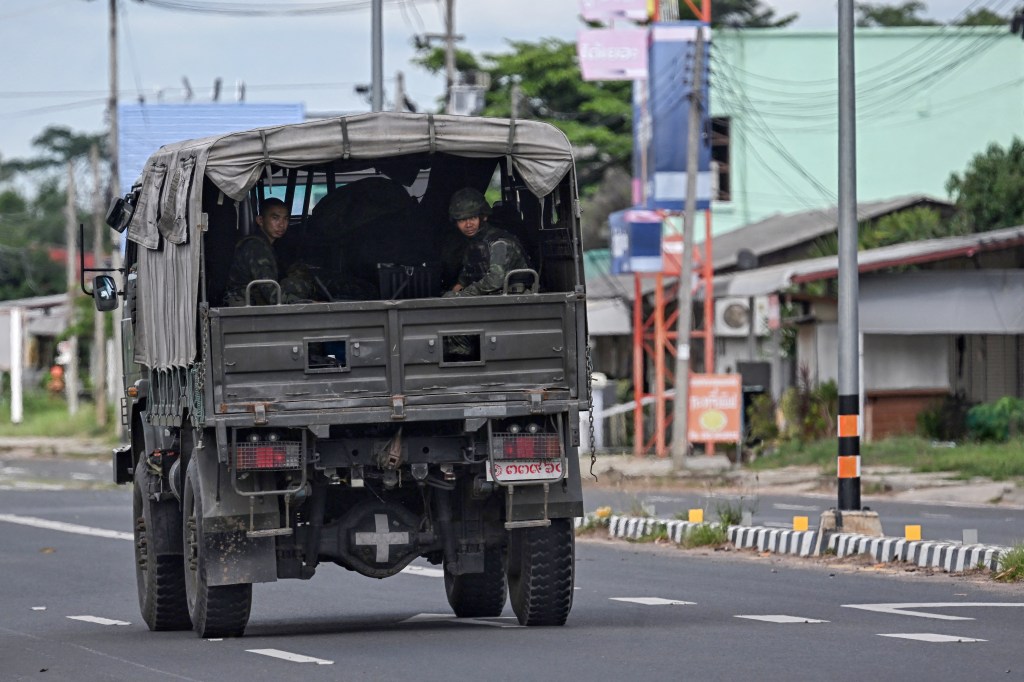
Cambodia denied Bangkok’s accusation, and, at least for now, the neighboring countries have yet to return to the brink of an all-out war. But the ceasefire remains on shaky ground. As regional and global players from Beijing to Washington urge calm, many of the conflict’s key drivers—including longtime territorial disputes and domestic political instability—go largely unaddressed.
The two countries agreed to lay down arms early Monday morning, as Phumtham and his Cambodian counterpart, Hun Manet, met in Malaysia to affirm their commitment to mutual de-escalation. Malaysia, the current chair of the Association of Southeast Asian Nations, or ASEAN—a regional bloc of which Cambodia and Thailand are also members—played a key role in brokering the agreement. China and the U.S. were also involved in mediation efforts, with President Donald Trump threatening to halt trade talks with the warring countries if they failed to reach a truce.
And indeed, Trump wasted no time in taking credit for the deal on Monday. “I am pleased to announce that, after the involvement of President Donald J. Trump, both Countries have reached a CEASEFIRE and PEACE,” he wrote on Truth Social. “Congratulations to all! By ending this War, we have saved thousands of lives. I have instructed my Trade Team to restart negotiations on Trade.”
On Thursday, simmering tensions along the two countries’ 508-mile shared border erupted into their first major confrontation in more than a decade. Both sides claimed the other fired the first shots after fighting broke out near the 12th-century Hindu temple of Prasat Ta Muen Thom, which sits in a disputed area near their border. Thailand accused Cambodian soldiers of opening fire on its forces with heavy weapons, including rocket launchers, while Hun Sen—Cambodia’s former prime minister and de facto leader—said Thai soldiers “started this war” by closing the temple and shooting at Cambodian troops. Thai officials ordered the closure of border crossings and, over the course of several days, conducted airstrikes on Cambodia, which targeted Thai border communities with rocket fire.
The escalation followed several flare-ups in recent months. On May 28, Cambodian and Thai troops traded fire near a disputed part of the border, leading to the death of one Cambodian soldier. Both sides accused the other of initiating the fighting. Then, on July 16, three Thai soldiers were wounded after a landmine detonated in disputed territory, after which Bangkok accused Cambodia of laying new mines. One week later, a landmine near a different stretch of the border wounded five Thai troops.
The continuing clashes largely come down to overlapping territorial claims. The unresolved issue is often blamed on colonial France, which in 1907 mapped out Cambodia’s borders. Fueling the tense situation, the disputed pockets contain important religious and cultural landmarks, including Preah Vihear, an ancient Hindu temple and UNESCO World Heritage Site. In 1962, the International Court of Justice issued a decision recognizing Cambodian sovereignty over the temple, but Thailand continues to claim the surrounding area.
The conflict also has shades of great-power competition. Thailand, which is classified as one of Washington’s non-NATO major allies, has a close defense partnership with the United States. It deploys American-made weapons, including F-16 fighter jets, and is widely considered to have one of the strongest militaries in the region. In addition to boasting an advanced arsenal, the Thai military has the manpower advantage over its neighbor, with 360,000 active-duty personnel.
Both countries have ties to China, but Cambodia’s run deeper. The small country, which has fewer than 125,000 active armed forces personnel, is increasingly dependent on Beijing for its defense. China has funded and upgraded the main naval base in Cambodia, which the U.S. reportedly believes has, in turn, granted the Chinese military special privileges at the strategic base.
But domestic instability, fueled by the conflict, likely overshadows any great power considerations. In Thailand, in particular, the latest bout of fighting came amid a moment of political turmoil. Earlier this month, Thailand’s constitutional court suspended the country’s prime minister, Paetongtarn Shinawatra, over a leaked phone call with Hun Sen. During the conversation, Paetongtarn addressed the former Cambodian prime minister—a friend of her father, former Thai Prime Minister Thaksin Shinawatra—as “uncle,” a term of respect and deference in Asia. She also appeared to criticize one of her country’s own military commanders, leading to fierce backlash, including accusations of treason and anti-government protests.
Questions surrounding Hun Sen’s decision to leak the conversation remain. His own political standing in Cambodia, where he ceded power to his son in 2023 after ruling as an effective dictator, is undoubtedly boosted by picking fights with Bangkok. But the scandal—like the recent conflict—also contributed to the Thai military’s growing power over its civilian leadership, stoking fears of a coup in the putsch-prone country. Thailand has witnessed 22 coup attempts, 13 of them successful, over the last century.
Today, the military remains a strong player in the country’s domestic politics, and nationalist sentiment from its fight with Cambodia has boosted it further. Analysts fear this dynamic could incentivize the Thai military to cast aside the ceasefire.
Since the May 28 skirmishes—regardless of which side fired the first shots—the fighting has been “facilitated” and “ramped up” by the Thai armed forces, said Joshua Kurlantzick, a senior fellow for Southeast Asia and South Asia at the Council on Foreign Relations. “They have always been very powerful in Thai politics and have had numerous coups,” he told TMD. “And they are ramping up their power, using the conflict and other means to gain more power over civilians and eventually have a coup, possibly.”
The truce “addressed the buildup at the border and some of the displaced people, but in the long run, I do not expect it to hold,” he added. “There are important reasons on the Thai side why it wouldn’t be in the interest of the Thai military to have it hold.”

















